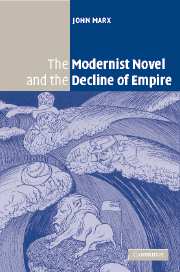Introduction: The decline of Britain and the rise of English
Published online by Cambridge University Press: 22 September 2009
Summary
In the nation that is not
Nothing stands that stood before
A. E. HousmanThis book contends that British modernism imagined the world as an array of discrete yet interconnected localities. It argues that modernist writing abjured the Victorian fantasy of a planet divided into core and periphery, home and colony in favour of the new dream of a decentred network of places and peoples described, analyzed, and managed by a cosmopolitan cast of English-speaking experts. Far from representing the last gasp of a nation on the wane, a ‘structure of compensation’ for a culture tortured by a sense of its ‘belatedness’, modernism joined hands with an interdisciplinary archive of scholarship and commentary to imagine a world of which England was no longer the centre but in which English language and literature were essential components of an abstract or virtual differential system that spanned the globe. To substantiate this claim, I concentrate on the infamous narratives of decline that characterize early twentieth-century fiction. I read these tales not only for the myriad ways they argued that England no longer occupied the core of an ever-expanding empire, but also for how they revised the very distinctions between British nation and English culture on which empire-building depended. I observe that such stories elevated English while devaluing Great Britain. In the process, they helped authorize immigrants and colonial subjects to write fiction in English that privileged marginality for a cosmopolitan readership.
- Type
- Chapter
- Information
- The Modernist Novel and the Decline of Empire , pp. 1 - 24Publisher: Cambridge University PressPrint publication year: 2005



